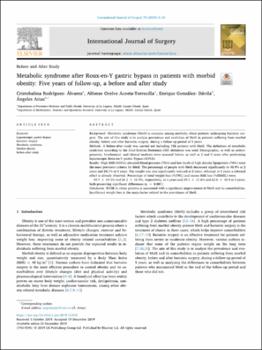Metabolic syndrome after Roux-en-Y gastric bypass in patients with morbid obesity: Five years of follow-up, a before and after study.
Date
2020Abstract
Background: Metabolic syndrome (MetS) is common among morbidly obese patients undergoing bariatric surgery. The aim of this study is to analyse prevalence and evolution of MetS in patients suffering from morbid
obesity, before and after bariatric surgery, during a follow-up period of 5 years.
Methods: A before-after study was carried out including 156 patients with MetS. The definition of metabolic
syndrome according to the Joint Interim Statement (JIS) definition was used. Demographic, as well as anthropometric, biochemical, and clinical analyses were assessed before, as well as 2 and 5 years after performing
laparoscopic Roux-en-Y gastric bypass (RYGB).
Results: High BMI (100%), elevated blood pressure (78%) and low levels of high density lipoprotein (70%) were
the most prevalent criteria for MetS. The percentage of people with MetS decreased significantly to 48.9% at 2
years and 24.1% at 5 years. The weight was also significantly reduced at 2 years, although at 5 years a rebound
effect is already observed. Percentage of total weight loss (%TWL) and excess BMI loss (%EBMIL) were.
49.7 ± 19.4% and 68.2 ± 18.9%, respectively, at 2 years and 29.3 ± 11.6% and 62.0 ± 24.9 at 5 years,
both presenting significant differences (p < 0.001).
Conclusion: RYGB in obese patients is associated with a significant improvement of MetS and its comorbidities.
Insufficient weight loss is the main factor related to the prevalence of MetS.






